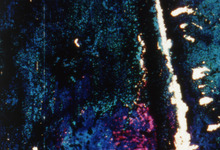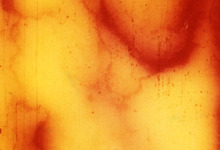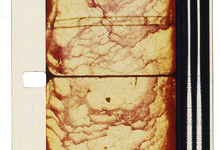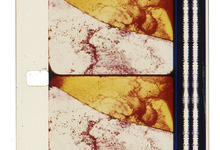Roland Barthes used to say « Aptly named, film (pellicula) is but skin without a gape, without an opening, without a wound». With direct cinema, this formula, which became axiomatic because of the flawless imagery found in traditional cinema, no longer verifies. The 'smooth' film of the image is metamorphosed into fragile skin. Contrary to scientific cinematography from the beginning of the century, the micro-organisms are not re-created (by being filmed) but rather reproduced directly on the film (frozen on the film strip, but made to move on screen by the driving mechanism of the projector). The point is, paradoxically, to reach the extreme of realistic representation by way of an abstract image, by actually showing the micro-organisms, with no other mediator than the lens of the projector. Every single curve, every single asperity that leaves a mark on the film is the movement of time itself, a trace of its passage. The 'secret forms' of emulsion are unveiled, and emphasize the materiality of celluloid, and the processes that reveal the image.
Proposing further evidence that film material is not inert, this film was made by literally burying pieces of black film during different periods of time and in different kinds of grounds (soil, snow, mud, etc.).
3 PRINTS IN DISTRIBUTION
|
distribution format |
16mm |
|
screen |
1,37 (single screen) |
|
speed |
24 fps |
|
sound |
optical sound |
|
rental fee |
40,00 € |
|
distribution format |
16mm |
|
screen |
1,37 (single screen) |
|
speed |
24 fps |
|
sound |
optical sound |
|
rental fee |
40,00 € |
|
distribution format |
Digital file on server (HD) |
|
duration |
8' 27 |
|
screen |
16/9 (single screen) |
|
speed |
24 fps |
|
sound |
sound |
|
rental fee |
40,00 € |














